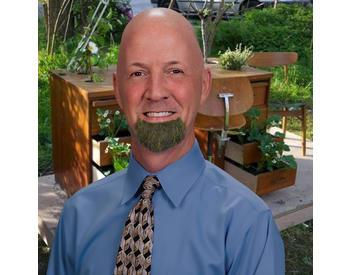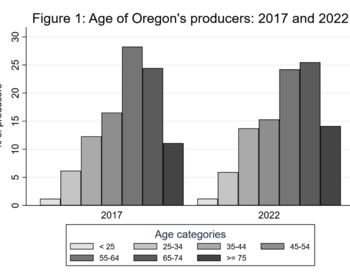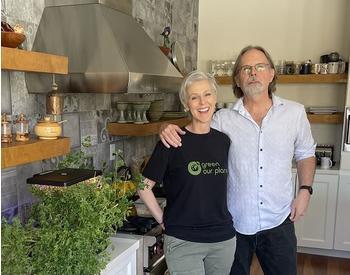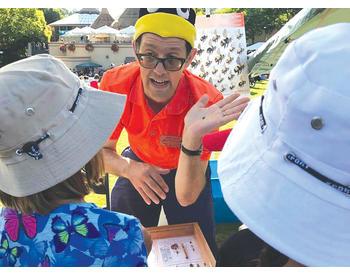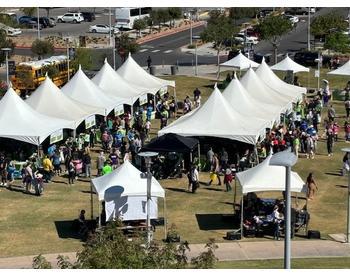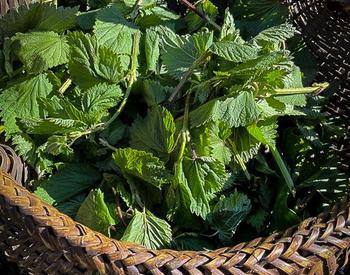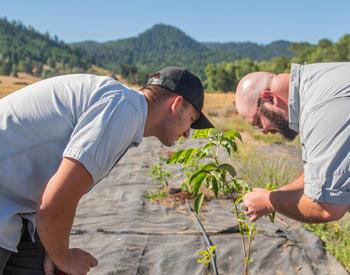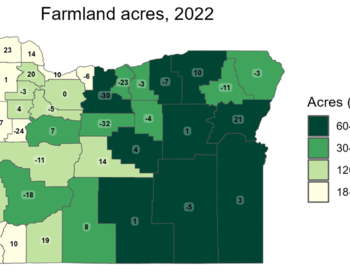Transcript
00:00:11 Michelle
Welcome to the farm to school podcast, where you'll hear stories of how youth thrive and farmers prosper when we grow, cook, and eat delicious, nutritious local foods and schools.
00:00:21 Rick
We're your host, Rick Sherman.
00:00:22 Michelle
And Michelle Markstein, we are farm to school and school garden coordinators for the state of Oregon.
00:00:28 Rick
Thanks for joining us today everybody. We have a really special guest today, John Fisher. John Fisher is with life lab. He has been in the forefront and a main architect of the school garden movement in our country.
00:00:47 John
Hi how y'all doing?
00:00:49 Michelle
Good. It's really nice that you could join us. Thanks for making time.
00:00:53 Rick
And you're coming to us from Santa Cruz, CA, is that correct?
00:00:54 John
I'm in Santa Cruz County, currently sitting in Watsonville, CA on the South part of our county where we grow all the fruits and veggies or the world for the world.
00:01:06 Michelle
How delicious. Well, tell us where you are at life lab. What's life lab?
00:01:14 John
Yeah. So life labs been around since 1979. We had a story of churning a a vacant parking lot into a thriving school garden, and from there through the 80s and 90s, Life Labs created curriculum, Common highlighted garden based education programs in the K5 grade levels and as we evolved, my journey with Life Lab started at around 2000 where I created an outdoor Learning Center on the University of California, Santa Cruz's farm, and I ran programs there- field trips, teacher training, summer camps. And that evolved then into doing more statewide networking and then moved into national networking. So my world now is more about promoting and networking and training adults in garden based education and that's one main element that life lab thrives in and another area where life lab thrives is our local programs where we are continuing to run camps and we have programs based in school districts, whether that's an instructor in a school teaching garden based science and after school cooking and nutrition. And then we also have support staff that are doing more of like the one person supporting multiple garden educators through technical assistance.
00:02:31 Rick
OK. And in the in all of this time when you when you're doing all this, you found time to write a book too. I'm holding a copy right here. The Book of Gardening Projects for Kids. And could you tell me how that came about? About when that started? I think it's like 2012, as I remember.
00:02:53 John
Yeah. So there was a.. Blair was his name, up in San Francisco, he worked at the alumni Community Garden Farm and somehow a book publisher connected with him and and had inquired about who would be good to write a book about gardening with kids. And he was an apprentice at the UCSC Farm, and he remembered me, and he knew of life lab and and just kind of got us in touch with timber press. And they kind of pitched an idea of what they were looking for. And then that turned into a book proposal that my coworker Whitney Cohen and I created and our whole angle there was really thinking about how do families garden with kids. So it was less about school gardening. Yes. At the same time timber press was working on a whole other school garden book with some great folks in San Francisco that have done school gardens for many years, and so our focus was we interviewed 20 different families that had strong kind of gardening ethics built in their family lifestyle, and we teased out different elements related to what makes a garden thrive over the years of your children. And my coworker and I put that together. She did most of the penmanship, and I did a lot of the research in photography and kind of the technical plans that we put into the book.
00:04:30 Rick
I'm glad you mentioned that it wasn't mainly for school gardens. It was a family-based book. I had that in my notes and I was going to ask you. And as a matter of fact, I have asked you, like, have you ever planned to do a follow up on like a book on school gardens? And you said you weren't really interested in doing writing, but doing you would rather do other projects. Could you expand on that a bit?
00:04:45 John
There's a lot of books on school gardens already, right? And so I don't necessarily know if we need another print book, but what I like to do is create a strong blog. We have a lot of great resources at lifelab.org, so building out those web-based resources, we have a really strong YouTube channel. Obviously, during COVID, everybody was making videos and that bolstered our video collection on our YouTube channel. So those are some of the areas that I like to share information. I wouldn't see us writing another book on school gardens. We do have other publications that we've written that focus on how to start a school garden. So in terms of what I'd like to focus on related to the type of publication, probably be more in the digital realm and continue to build upon the blog-based resources that we have and our YouTube channel and then the work that I've been doing with the school Garden Support Organization network continuing to have some strong webinar content.
00:05:48 Rick
Great. I think we can appreciate that, Michelle and I wouldn't go as far as to say “print is dead” or anything, I still read a book every night before I go to bed and I still enjoy reading, but you're right, there's so many things out there and we, have produced videos and digital content before too, so in this day and age with students and kids being able to access all that stuff, it's really great to diversify a little bit.
00:06:21 Michelle
John, tell me a little bit more about peer-to-peer network. What are what are you referring to when you say that and? What motivates you to do that work?
00:06:32 John
That's a great question. So in the school garden world, even more so than the school food world, folks are isolated. So at a school, usually there's only one school, garden coordinator or if we're looking at a region, usually there's only one organization that's like, you know, beating the drum or as the champion of school gardens in that particular region. So folks are often isolated. And so we've recognized that just getting people together, getting the right people in the room or on a forum or on a webinar, sparks will go off and people really get what they need. When I think of school gardens, I always say there's not one way to do a school garden. There's hundreds and that's a blessing and a curse, right? Because there's no one way to do it, but to find out all those other ideas that might be relevant for your program come about by networking and talking to others that are in the same predicament as you. So school gardens, being that they don't normally have a sustained funding stream and they're not necessarily institutionalized in most school districts. Everybody's coming up with different ways, different funding mechanisms, different staffing models to get kids to receive instruction in the garden. And so getting folks to talk shop and share their ideas, what we see is someone will get an idea and they'll get the little legs, they bring it home. They mix it up and they make it work for their particular space. And so I've seen that over the years, you know, sharing stories that I know have lakes, for example, one funding mechanism that I like to share a lot is the sub swap model where I met a teacher in Paso Robles, CA. You got a paid full-time sub, you know. A consistent sub every Friday, the same sub would come and release her to be the garden coordinator for her school just thought was brilliant cause now you're getting a full time career. Veteran teacher at the cost of a sub. And she would run the program for her school, fully embedded in the school environment, she knows all the students. She knows all the other teachers, great relationship with the principals. All of those things lend to success and then her principal loved having her be the garden coordinator for the school. It's easy for him to find sub money and he was able to provide the consistent sub and so that model I always like to share. And then I've seen other school districts that then have applied that same model to get a teacher released with a sub. Easier to find somebody releasing a strong teacher to hold the school garden space. So that's an example of like just one little scenario of like we just got to keep swapping stories of success and sometimes they stick for others, and then they'll be able to realize them in their own programs.
00:09:29 Rick
Here locally we've done a a school garden survey every year in, in our state. And when we first started in 2012, we found that about 12% of schools in our state had a paid person teaching actively teaching. It was mostly volunteers, as as as you're talking about, this is that swab swap is such a great model for people to look at things like anew, but but the last time we did a survey, we found that I think it was like just about half of our schools had some form of education going on, either either the teacher was allowed to teach a couple classes a day or they were a full time horticulture teacher, or we had a full time school garden paid position. But so I think the needle is moving, but that hasn't really stuck with me. The sub swap I must not have heard you say that before. It's kind of like something new to me. So that's that's really good. I'm gonna have to try to push our folks to that model too.
00:10:39 John
Yeah. And, you know, not gonna work everywhere. I know places have a lack of substitutes in these models. What was nice about it is the teacher that was leaving was replaced by a sub that was the same sub every week. So there was continuity for the students.
00:10:57 Rick
We've asked you this before of like, what would be your call to action? What would be the one thing that our movement in school gardens is needing? And I think I've heard you say many, many times is, you know, we need paid positions in here, so I think I always say that it like school gardens and cafeteria food. Education is an afterthought. It's it's more thought about food to nourish a body, which is great. But when you think of the school garden and the cafeteria as an integral part of the education system, then the people's minds start getting turned. So I I don't know if do you, do you still agree with that? That would be like our number one issue in our movement as it as it were.
00:11:46 John
Yeah. I mean, imagine if someone said, hey, we're gonna teach 2nd grade with all volunteer labor like that would never happen, right? Or like, we're gonna have all janitorial staff be volunteers and community members. It's Like to truly have the garden based learning movement thrive and have strong programs, we're gonna need paid people to do that and and it's and and. And maintaining a living classroom or an outdoor garden space is a classroom actually is a little bit more challenging than you know. I mean, of course we've got to clean classrooms every day, and janitors are paid to do that, right? But the classrooms aren't filled with irrigation systems and hundreds of millions of living creatures, and they don't flood and they don't freeze. They don't need pruning. So you know, not just, you know, the instructions one part, but then caring for a thriving outdoor space that needs a little more maintenance and care than than saying indoor space. So we definitely need, we need paid people and that and that's the challenge I think that we're looking towards is like where you know different states. We created policy and legislation money that goes to create gardens, but staffing them is harder, harder issue and then staffing them at the same level that we're staffing a second grade teacher. You know where you, you know minimum $100,000 with benefits and all that things. How are we gonna get there? And I've seen different school districts that have come up with different ways to fund people to be in their gardens in Santa Cruz, most of our elementary gardens have some sort of paid staff position, which which is nice, but still it's not quite where it's the best.
00:13:30 Michelle
And when you say that different staffing models, can you flush that out a little bit more like how are they, how are these funding streams, how are they finding them?
00:13:41 John
Yeah. Oh I mean, in Santa Cruz County, I mean, I could share in in two of our school districts. There's a parcel tax for education, so it's every nine years. This comes on the ballot. It's like measure P it's for the schools and it pays for instructional Aids. It might pay for some upgrades to the physical lights and there's a small small line in those millions of dollars that pays for the four garden coordinators in Santa Cruz City Schools and a small line that pays for the three garden coordinators and Live Oak schools. And so those are not huge school districts, but it is paying for part time instructors to teach during the school year, only one of the districts has a few hours during the summer for the garden coordinators to continue to visit the gardens. So that's a partial tax. So that has to be voted upon. People that are agreeing to tax themselves for the sake of public education and in our community. Luckily we have that. Other districts in in Santa Cruz County have been funded in other ways. So in Para Valley unified, which is our largest district with about 16,000 students, 16 elementary schools there there was a Superintendent that recognized there was some surplus money coming out of COVID and invested those funds to do school day instruction where we'd have full-time instructors year round and that was paired with money through our extended learning or after school programs. There is a lot of funds in the after school world. There's a lot of funds in that career. Technical education or CTE realm at at different schools that I see fun school gardens. So here in Pajaro Valley Unified School District, we are using those after school funds to have after school garden classes. 12 classes per per week, so a lot of instructions happening at each site and then the other school districts in Santa Cruz City Schools are smaller districts or excuse me, in Santa Cruz County, they're smaller districts and those are usually coming through a mix of small grants PTO funds and then just discretion from a principal saying like I recognize having a paid person makes sense. And they'll, you know, contribute a couple $1000 to get a very part-time person, but that very part time person is that one that could then mobilize volunteers or mobilize work days or community partners to keep the space thriving and to communicate with the teachers to get the kids out there. So it's a it's a mix. Like I said, there's no one way. There's a lot of different ebbs and flows definitely over time, there's times when there's more money and then there's less money and that's it's something I've learned. When I talked to some of my staff about, you know, well, how should we plan this garden? I often say, well, let's plan that this garden might not have as much funds in three years. And so it's kind of an interesting concept to plan for for a downside, but from what I've seen is usually gardens go up and down and their trajectory of excitement and then abandonment.
00:17:03 Rick
Yes. Or let's plan on your replacement for when you leave. That's been always my biggest thing is, when a school garden coordinator is on fire and there and you know, life happens and jobs change and the person might have to leave and quite often they don't have anybody in the wings to take over the project and it dies a horrible death (the garden does, yeah).
00:17:27 John
That’s a really great, great, great point in the succession plan. I've seen that happen a lot where someone comes in and completely reinvents the wheel, yeah. And and so I would say for any of you that are garden coordinators out there or you know or teachers that are at programs that have strong gardens really think about how you can set up a way to share what worked in your program, yes. You know, I I would track all the grants I wrote for the school garden that I managed for seven years. All the grants I wrote. I just always documented them and kept them on a Google Web page so that we can just reference them one to see, you know, which ones have we already gotten. And then two usually these small $3000 grants, they're always kind of asking the same questions. So we can then just recycle the questions. So just having some sort of archives is kind of a valuable element, and there's no guarantee that the new person will jump in and, you know, look at your archives. But I have noticed that the garden coordinator that replaced me didn't look at the files immediately, but a year later came and said, “hey, can you remind me of this?” and it was so great to say, “oh, it's all in this folder. Let me share it with you.”
00:18:39 Rick
Yeah, John, I have my go to people here in my state that I rely on heavily that have figured it out. They they can raise money super easily and they're just wired that way. So they have a big foam board of of everything they do and pictures of businesses they hit up. And so I have them come and invite them and local talks and stuff and to get everybody else charged up. But it's it's really not everybody is wired to do that like you.
00:19:06 John
Say, I want to share one other funny element that I always share whenever I get a stage and this is my stage there. There is a mandate within or it's a memo within the USDA, you know, school meal program that school meal money in a budget for a school meal program can be spent on garden education. Yes, supplies or people. Even so, that's not to say that all school food service directors have a flesh budget and could say like, oh sure, I'll buy your seeds, or I'll buy your card and noses, or I'll buy you soil. Or I'll pay for a nutrition educator. But that the money is allowed through the eyes of the USDA to be spent on garden enhanced nutrition education.
00:19:52 Rick
That's huge. It's a justifiable expense.
00:19:55 John
Yeah, exactly. So just want to let folks know. So if you have a good relationship with your school food service director and you have a school food service director who's interested in the benefits of teaching kids about fruits and vegetables, as they're also, you know, serving them in the cafeterias. It's kind of a win win because they have a budget. School food is a business, whereas school gardens often don't even have a budget line.
00:20:20 Rick
Yeah, that's it. You just have to have the school Nutrition Services director have the want to do that. And like I say, we're moving the needle all the time. It's becoming more of a thing, but they have speaking as a former food service director. I mean, there's so much on their plate that sometimes they might not necessarily have farm to school in their forefront. I mean, I didn't. I was very passionate, let's say that about farm to school and and and so that it changed my life and I I do farm to school full time for a living now but it's just getting people to see the benefit, and once they start getting the Pats on their back, then it becomes easier I think.
00:21:08 Michelle
So John, taking a national bird's eye view, can you paint us a picture of what's happening in school gardens on a national level? I mean, are they just in California? Are they all over the country? Do we even know how many there are?
00:21:25 John
Yeah, that's the $1,000,000 question. We do not know how many there are. I'll get that question asked and you know that the USDA does their farm to school census, but it doesn't do the best job capturing the true data on district, you know districts that have gardens, but I guess it's a start so that that is that is a national census or data point that you could look to. But I do feel, you know, to Michelle Obama had that, you know, let's move campaign and she came and said let's move and that was at the same time at the farm to school movement was really starting to come and do its own and thrive and you know, make some strides and we saw bigger grants come down through different state programs and USDA Farm School program was, you know, established and started to put out grants as well. And so I would say that, you know, in the in the 10s, 2010 coming to present has been a continued growth of school gardens, whereas before 2010, not all states were on board. It wasn't as an exciting thing. There might not have been farm to school type programs at different States and then coming into 2010 and moving forward is when I kind of started to see a lot more states get excited around school gardens and you know, seeing what happened in Oregon. You know, prior to that too, you were all, like looking at legislation to to drive funds to school garden. So. So I think we're on an upward trajectory, but I think for, you know, maybe for every two school gardens that come on board, one might be failing. You know that whole that whole issue of it's kind of hard to create and sustain school gardens over time. But I do feel at this time right now we have more school gardens, you know, in in the last 40 years than than we've ever had. More states are on board. They have resources, they have staff because of farm to school, there's school food service directors that will have kind of a nutrition educator that will kind of keep the pulse of the gardens, and support them. So I have definitely seen that action happening. You know, food court happened came into its own, you know, around this time 2008 is maybe when they didn't, you know? And I don't know how many service members they have now, but probably close to 300 where they're doing the work in schools, along with kitchens and gardens. So. So I do feel we're on an upward trajectory. I do see the grants that are funding school gardens are expanding. I know in California, we had a little lull going on, but then recently a lot of money has been coming in through a lot of different departments. We have a full now farm to school program with, you know, regional staff across our whole. They, unlike any other time. So we're we're at a high right now in California, which is really, really exciting to see. So you know to answer the question, I think we're, we're we're at an apex and I think we're still going forward. I don't see anything, no research is coming out and saying school gardens are negative for kids.
00:24:42 Rick
No, everyone wins. I do want to point out something you said. You said “sometimes, words to the effect of, some some school gardens are thriving and not all of them are like for everyone.” They're there might be some they're struggling, but I think that's important. Like in Oregon we we we're able to find out where all of our school gardens are and I'm as the custodian of that system I never get rid of a garden. So it might be in hiatus status, but at least I know they've had one before and it just needs to be plugged in and so I could give those to our regional coordinators for those people to say, hey, what would it take to get your garden up and thriving again? So I think, knowing is the battle sometimes, and obviously in some states like California. It's as it it's as big as, multiple states you know, in terms of number of schools, you have thousands of schools, so it it's really hard to get a handle on all of those.
00:25:45 John
Yeah. And I just that was just a made-up stat. You know for every two two gardens, 111 fail. So don't quote me on that. But Rick, would you say that you see gardens come up and then disappear and it's kind of a cycle.
00:25:50 Rick
Oh yes. Yes, definitely. I I think so. It just depends on the leadership of the garden and like if somebody you know burnout is a thing sometimes you know and it's just like I said before, it's how good is your support network and how much is your do you have somebody in the wings waiting to to help.
00:26:22 Michelle
I always call it the three-year love bubble. Right?
00:26:26 John
Yeah, yeah. Everyone wants a puppy, right? You know that you keep it going.
00:26:32 Michelle
Well, what do you think about this? Because I have been wondering if there, that's really not a problem in the sense that there are so much skills and community that is built in the development and coming together of a garden, and even if it's the three-year love bubble and it pops and it fades away. That doesn't detract from the next time the cycle starts up again and people put attention.
00:26:59 Rick
Or the lives you touched in that three years, like you might have developed some horticulture lists some kids that you know there that was valuable time.
00:27:11 Michelle
Yeah, I just, I've. I've wondered that actually cuz part of me gets like was that a waste of time and resources and the other part of me is like maybe nothing's ever a waste of time and resources.
00:27:22 John
No, I mean, what other what other space can you build community around and and where kids can take pride in ownership, you know, usually they don't do that over their textbooks. They don't do that over their chairs. But a space, you know, I had kids come into the garden and pull me aside and run with, like, the light and point to a tomato plant and say I brought that from home and put it in the garden. Hmm. You know, like there was so much and this child chose to do it during his recess, you know, to like garden and tend his one little tomato and watch it, right? Yeah. So there there's this sense of pride and ownership. That, unlike many other spaces in in the school that that a garden could create, I had I had one garden coordinator share something I thought was really interesting at first. I'm like, that's not a good idea. And then later I thought maybe that is the idea. They say they like to build Cobb benches, ones made out of free form, mud. Because they fall apart, and then you're gonna have to get a group of people to rebuild it later. And to me, at that time, I was like, no, I just want something to last forever. But there's something to say about having something that, like, over time, you have to reinvest and relearn and recover. I just thought, you know, that was kind of an interesting metaphor to to this whole idea that gardens could build community like you build it in, you know.
00:28:43 Rick
Nice. Well, John, we, I could probably talk to you for another two hours about some of this, these things, there's things that we probably even haven't got to, we're just scratching the surface. I will commit to. However, in the in our show notes, if you go to the show notes there, you'll have John's bio and some really nice surprises about John's life that you can read about and and you guys can be more educated there too.
00:29:11 Michelle
Hey, great. Thanks so much everyone for listening today and thanks John for joining us.
00:29:17 John
Thanks for hosting this, this is great.
00:29:20 Michelle
A farm to school podcast was written, directed and produced by Rick Sherman and Michelle Markesteyen, and was made possible by a grant from the United States Department of Agriculture.
00:29:30 Rick
The content and ideas on the pharmacy school podcast does not necessarily reflect the opinions of Oregon State University, Oregon Department of Education, and the United States Department of Agriculture. The USDA, Oregon Department of Education and Oregon State University are equal opportunity providers and employers.
00:29:49 Michelle
Do you want to learn more about Farm to school and school gardens? Check out our website, episodes, show notes, and contact information at Farmtoschoolpodcast.org
00:30:04 Rick
We would love to hear from you too. Stop by the website Michelle just mentioned to say hello or give us an idea for a future podcast. Again, that's www.farmtoschoolpodcast.org.
00:30:16 Michelle
Thanks everyone. Thanks John. Great talking.
00:30:18 Rick
Thanks John.
00:30:19 Michelle
Me again.
00:30:20 John
Thank you. Bye bye.
Join us as we interview John Fisher, from Life Lab in Santa Cruz County, California. John has dedicated his life to bringing school gardens to the forefront in the USA, and has been a main architect in the school garden movement.
Through his work at Life Lab, John Fisher has taught tens of thousands of students and trained thousands of educators to bring learning to life in a garden. Over the past two decades John has been a national leader of the garden-based learning movement John has been involved with the SGSO Network since day 1, helping to formulate the idea of a peer to peer network for school garden professionals and support organizations in 2012 at the National Farm to School Conference in Burlington, VT. Since then, he has helped build the cornerstones of the SGSO Network, including the forum, the Leadership Institute (hosted by Life Lab), and now the Growing School Gardens Summit, as well as countless webinars and virtual gatherings. John loves to bodysurf, swim, go camping with his family in the CA mountains and hang with his dog Woogie. He grows an asian pear and fuyu persimmon tree and loves to eat them too.
John co-wrote the book “The Book of Gardening Projects for Kids” with Whitney Cohen.
The Farm to School Podcast is produced by Rick Sherman, Farm to Child Nutrition Program Manager at the Oregon Department of Education and Michelle Markesteyn, Farm to School Specialist at Oregon State University Extension with production support from LeAnn Locher, OSU Extension. The show is made possible by a grant from the United States Department of Agriculture.
Want to connect? We’d love to hear from you!
